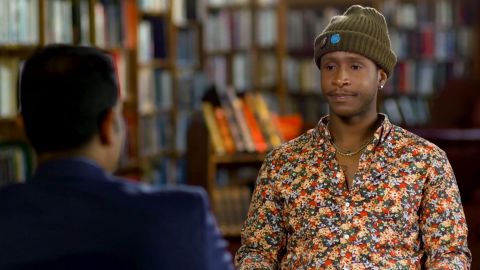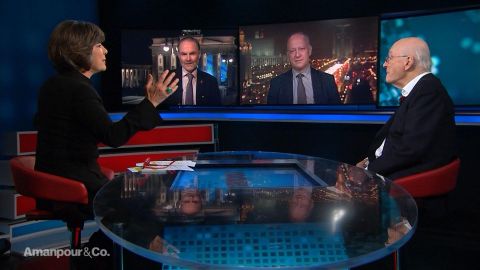Read Transcript EXPAND
CHRISTIANE AMANPOUR: Well, just remind us of what that botch was because that mistranslation or misunderstanding led to the hordes going to the wall and breaching it.
CHRISTOPHER MALLABY, FORMER U.K. AMBASSADOR TO GERMANY: Yes. He was — had a piece of paper in his hand which came from a meeting of the leadership of the communist party and he was sort of squinting at it and not getting all of it right. The main thing he did not get right was that he said that the opening of the fascia would be right now when it was supposed to be seven hours later. So, a huge difference but it made — it brought the people out and that was the beginning of a great improvement in European peace.
AMANPOUR: So, let me turn to you in Moscow. Andrey Kortunov, because this was all about the face-off between then the Soviet Union and the West. What did you think when you heard what was going on? Because you also were in Berlin at the time.
ANDREY KORTUNOV, DIRECTOR GENERAL, RUSSIAN INTELLIGENCE AFFAIRS COUNCIL: Yes, I was in Berlin and I participated in a small meeting of emerging European leaders. And when we heard that the wall was going down, we decided to take part in the physical demolition of this structure. So, we went to the Brandenburg Gate and we made our very modest contribution to the physical destruction of the wall. And for us, it was a great happening. We were very young. We felt that it was almost a medical or holiday. And, of course, everybody was very enthusiastic. And as a Soviet citizen, I can tell you that I didn’t feel any unease or awkwardness because it was Gorbachev was a magic word for many Germans around. So, I felt pretty together with other emerging leaders from various European countries.
AMANPOUR: That’s amazing. Mikhail Gorbachev, obviously, the leader on whose watch this happened. And to you, Timothy Garton Ash, who was there at the wall, who saw, you know, the initial attempts to breach it. It is so important that Gorbachev himself said, that we will not send in the tanks. We will not crush this. This has to be a peaceful situation. Tell me what you thought as a young man all those years ago.
TIMOTHY GARTON ASH, HISTORIAN AND AUTHOR, “THE MAGIC LANTERN”: So, I had lived behind the Berlin Wall and East Berlin and traveled behind the (INAUDIBLE) for 10 years before. So, for us, the wall was almost like a fact of physical geography. It was if the (INAUDIBLE). I got here the next day. I walked through an immediately — recently demolished great section of the Berlin Wall, actually, side by side with the American commander who looked rather bemused by this surreal happening.
About This Episode EXPAND
Christopher Mallaby, Timothy Garton Ash and Andrey Kortunov join Christiane Amanpour to remember the fall of the Berlin Wall 30 years ago. Wendell Pierce discusses his role in the West End Theatre’s production of Arthur Miller’s “Death of a Salesman.” Actor Jimmie Fails speaks to Hari Sreenivasan about gentrification and his film “The Last Black Man in San Francisco.”
LEARN MORE


